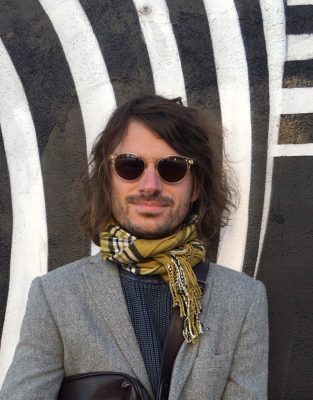Postdoc Spotlight: Josh Strable

Josh Strable is featured as part of Cornell’s Postdoc Appreciation Week 2018.
Josh Strable is from rural Iowa and has a PhD in Plant Biology from Iowa State University in Erik Vollbrecht’s lab. He conducts research in the field of plant biology in Michael Scanlon’s lab in the School of Integrative Plant Science.
What is your area of emphasis? Why is this work important?
I am trained as a developmental biologist, use genetics to find insight into questions, and work with cereals – primarily maize – as a model system. My research questions are basic and focus on how leaves develop, how leaf structure influences canopy architecture, how signals derived from developing leaves regulate the activity of plant stem cells (called meristems), how flowers develop, how groups of flowers (called inflorescences) are arranged, and how plant hormones shape leaves, inflorescences and flowers. Fortunately, many of these topics are interrelated. This work has led to the discovery of genes that function as critical components of yield traits, like leaf angle and the development of grain-producing structures.
This research is important on several levels. For example, leaves are the primary organ for photosynthesis, and maximize light capture and gas exchange in diverse environments. In fields and forests, leaves contribute to complex canopy structures. Canopy architecture is a key component of optimal planting density for many crops, and commercial maize hybrids have very upright leaves that maintains efficient light capture under dense planting practices. This has led to significant gains in grain yield over the past century by maximizing the number of plants in a given area of land. Understanding the genes that govern leaf traits may promote further reductions in land usage without compromising yield. A long-term goal of my work is to develop more climate-resilient crops, as global climate change will have major ramifications on global food security. For example, maize is an indispensable caloric source for a majority of the international population and is a key industrial feedstock for many nations. Maize is also largely susceptible to heat, drought and flooding stresses. The plant hormone ethylene is a key regulator of plant growth and development, and stress response. My research aims to identify genetic variants of maize that underlie stress tolerance associated with ethylene response.
Have you won any awards or fellowships?
I received a National Science Foundation National Plant Genome Initiative Postdoctoral Research Fellowship to support my research. I am also part of a collaborative project that received a 2018 Cornell Council for the Arts Biennial grant for a genome-based light installation called ATGC.
What inspired you to choose this field of study?
As an undergraduate, I was fortunate to work in a lab that used mouse embryonic stem cells (ESCs) to make preclinical models of human diseases. Though I quickly learned that mouse was not my preferred model system, the questions regarding development and how ESCs become fated to a specific cell type, as well as undergo self-renewal, helped cultivate my interest in developmental biology. I moved to plants for my master’s work and kept asking plant-related questions in my doctoral research. Plants are excellent for studies in development, as they continually produce new organs, such as leaves and flowers, from meristems that are continually active throughout their life. What inspires me to remain in this field are endless interesting questions and great collaborators and colleagues, both here and abroad.
How has your background influenced your scholarship?
I was raised on a century farm in central Iowa, and I am a first-generation college graduate. I grew up in a family where everyone worked hard, spent lots of time outdoors and very little time around the television. Growing up on a farm, there were many situations that lacked a blueprint; I grew into a certain comfort of knowing how to figure things out. These—working hard, staying active, solving problems—I would say are the foundation of my scholarship.
What else has influenced your thinking as a researcher or scholar?
Stepping outside my field of study. I take any opportunity to interact with people in different fields and with folks that are not part of the Cornell community. I believe it is good to keep up with reports from other areas of study and to frequent galleries around town and campus. Through these actions, I take note of what influences other people’s thinking, and this in turn influences my thinking at all levels.
What other hobbies or activities do you enjoy in your spare time?
I enjoy simple activities, like engaging in conversation, travel, visiting museums, collaborative art projects, reading poetry, collecting vinyl, and volunteering at WRFI Community Radio.
Why did you choose Cornell?
When I was offered a position as a postdoctoral associate at Cornell, my partner and I were also weighing options in Palo Alto, CA and Cold Spring Harbor, NY. We wanted a smaller, more affordable city, and a university that offered excellent programs in our areas of interest. A big decision distilled to simple criteria; Ithaca and Cornell were a perfect match for us.
What’s next for you?
I often ask this very question. I am yet to explore the answer(s).
Do you have any advice for current graduate students?
Usually I am not one to offer broad advice, but what I might encourage is to (re)read Rainer Maria Rilke’s Letters to a Young Poet.
